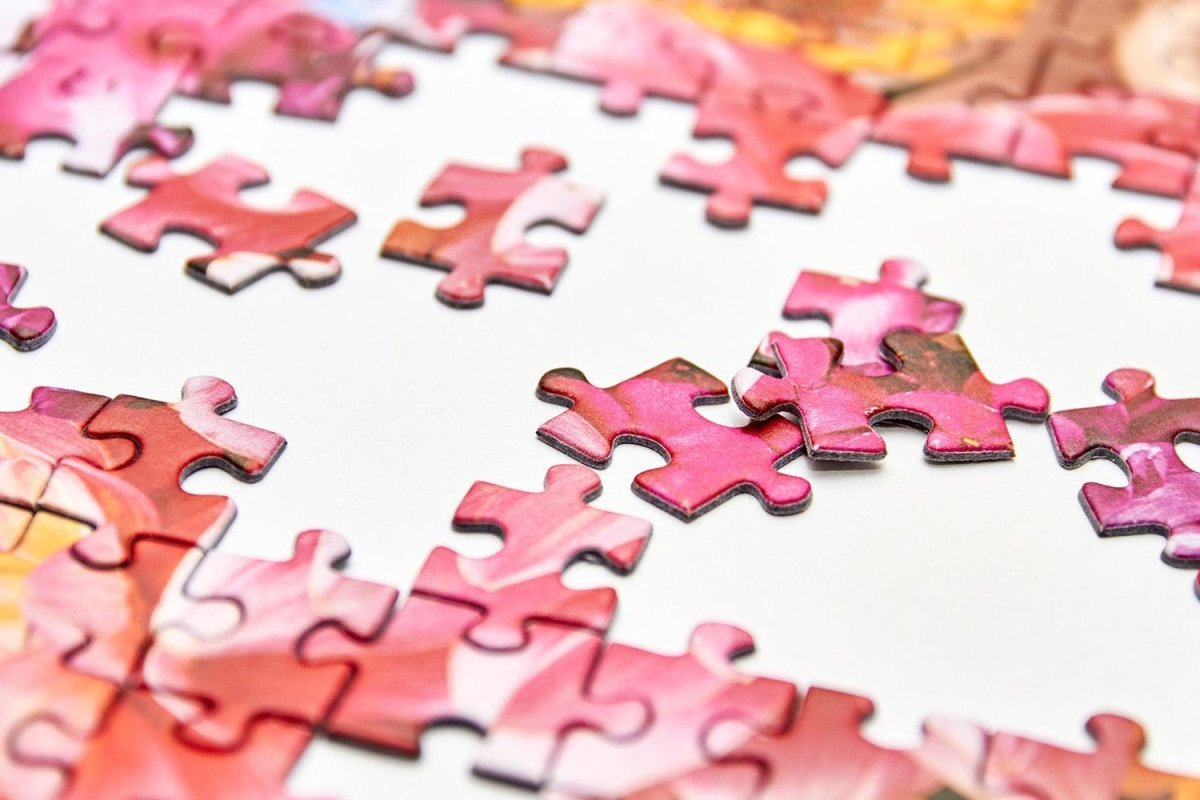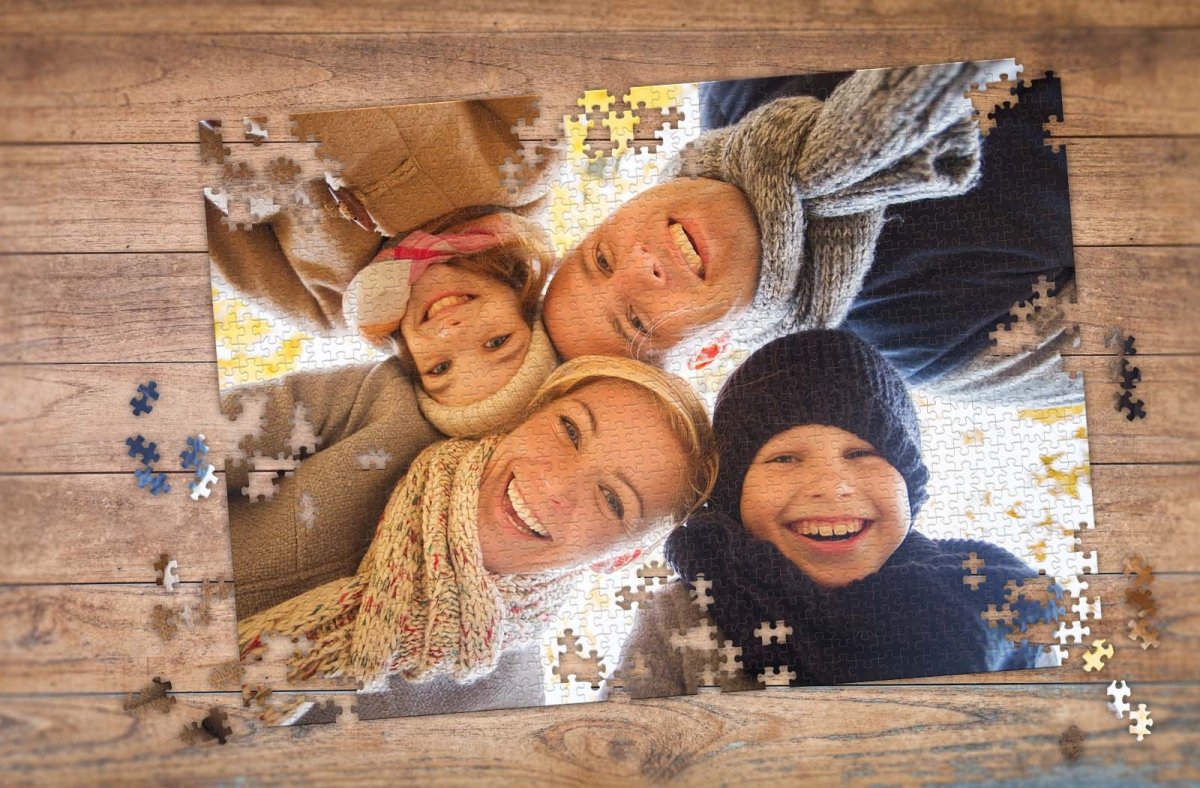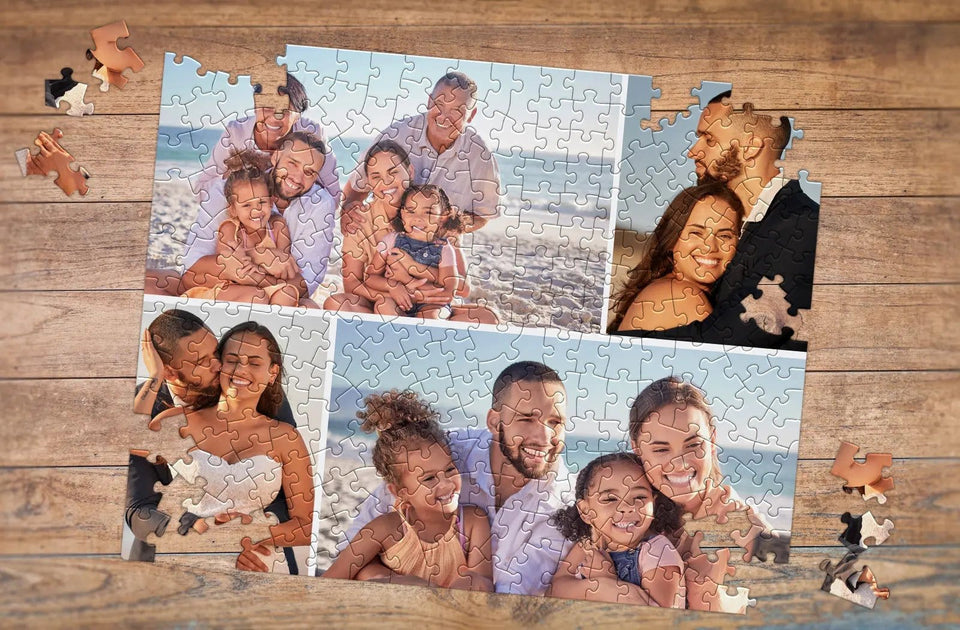Jigsaw puzzles can positively affect mental health and can be incredibly enjoyable. If you're wondering what the right puzzle size is, we are here to help you choose one that promises fun and satisfaction.
From challenging custom jigsaw puzzles to low-pressure, holiday-themed puzzles, we'll introduce you to the beautiful world of puzzles and help you select the right skill level for yourself or someone special.
What Is the Right Puzzle Size for You?
Puzzles can range from a few pieces to a few thousand pieces, offering varying difficulty levels and time commitment. Knowing a puzzle's dimensions and challenge level will help you determine whether it's the ideal one, whether you're selecting a puzzle for yourself or as a gift. Let's review some of the most common jigsaw puzzle sizes.
100-Piece Puzzle
A 100-piece puzzle is a perfect fit for young children just getting into the habit of solving puzzles. These typically contain XXL-sized pieces measuring 1 ½" to 2 ½", making them easy to assemble and ideal for kids ages 3 to 4 or adults looking for a more manageable challenge. Young puzzlers, in particular, will revel in seeing the final image come together, making a 100-piece puzzle a perfect gift on a special occasion or a great activity for a birthday party or playdate.

260-Piece Puzzle
If you're looking to assemble a puzzle that requires more time, a 260-piece puzzle may be what you need. This puzzle size still suits all skill levels, offering a satisfying challenge and a quick, enjoyable win without compromising on fun or difficulty.
500-Piece Puzzle
If you prefer something with a higher degree of difficulty or you want to take your time with a more complicated puzzle, try a 500-piece puzzle. On average, a puzzle of this size takes between two and five hours, balancing complexity with manageability to make for an enjoyable experience for everyone.

1,000-Piece Puzzle
For avid puzzlers, a 1,000-piece puzzle offers a tough challenge and a fantastic sense of achievement. This type of puzzle typically has large dimensions—for example, more than 24 inches wide—and can take more than 20 hours to complete.
Because of the necessary time commitment and challenge, a 1,000-piece puzzle is not suitable for small children or anyone who might find handling small pieces difficult. Those individuals might instead get more satisfaction out of a puzzle with fewer and larger pieces.

Factors to Consider When Choosing a Puzzle
Finding the ideal puzzle is an exciting experience that can take some time and thought since puzzle sizes can range from 100 pieces to a far more challenging 1,000 pieces. But solving a puzzle is so rewarding — it requires imagination, stimulates your mind, and is lots of fun — that determining the right one is well worth it.
Before you embark on your puzzle journey, consider a few factors that will help you determine the right size for you or someone close to you.
Skill Level and Experience
Puzzles vary in size and difficulty, so choosing one that matches your skill level is essential. Adult beginners will likely want to start with simpler 100 to 260-piece puzzles, while experienced puzzlers can enjoy 500 to 1,000-piece challenges. Selecting the correct piece count and size ensures a more enjoyable experience without causing you to feel overwhelmed.
Time Commitment
When deciding on the right puzzle size, consider how much time you want to spend completing it. A 1,000-piece puzzle might take more than 20 hours to finish, whereas smaller puzzles, such as a 100-piece or 260-piece puzzle, could require between 30 minutes and 2 hours of effort.
Complexity
Pick the degree of difficulty that appeals most to you to ensure your ongoing engagement and enthusiasm while working on the puzzle. If you want a mildly challenging experience, choose a 260-piece puzzle. Or, if complex problems excite you, opt for a 1,000-piece jigsaw puzzle to test yourself.
Subject Matter
Suppose you're not interested in the puzzle's subject matter. In that case, you're less likely to stick with it long enough to complete it — especially where extra-large puzzles are concerned. Additionally, certain subjects are better served by a larger size. For example, a landscape image puzzle may look far better in an extra-wide puzzle width.
Personal Preference
Your preferences can also play a huge role in choosing your perfect puzzle size. Puzzles with hundreds or thousands of pieces might appeal to you if you enjoy puzzles that feature stunning photographs, like a beautiful landscape or significant landmark. On the other hand, you might enjoy smaller puzzles if you prefer motifs and patterns.
Space and Storage Considerations
When choosing the right puzzle size, consider the space you have available for assembling and storing it. Puzzles, especially those with higher piece counts, can take up significant surface area, so having an appropriate setup is vital to a stress-free experience.
Workspace Size
Larger puzzles, such as 1,000-piece sets, often require more than just a table corner to spread out. Before you start assembling, ensure that your surface is large enough to accommodate the puzzle's dimensions. For reference, a completed 1,000-piece puzzle may be over 24 inches wide, meaning you'll need a workspace that provides room for the puzzle and sorting and organizing pieces. Puzzle mats or foldable tables are great options for easy setup and portability.
Puzzle Storage Solutions
Suppose you don't have the luxury of leaving a puzzle out for extended periods or like to work on puzzles intermittently. In that case, there are several storage solutions to consider. Puzzle mats, for example, allow you to roll up and store your puzzle in progress without disturbing your work. This is especially helpful for larger puzzles that may take days or weeks to complete. Similarly, puzzle boards with built-in storage trays can make organizing and storing loose pieces easier while keeping your work surface clear.
Long-Term Display or Break-Down
Consider framing if you're particularly proud of a completed puzzle and want to display it. Make sure to plan for a frame that fits the dimensions of the puzzle, plus any matting you wish to include. If you're not planning to display your puzzle, be prepared to disassemble and store it properly. Puzzles can be stored in airtight bags or containers to keep pieces from being lost and to ensure they remain in good condition for future use.
Benefits of Solving Puzzles
Puzzles can be a great way to pass the time but also have cognitive and emotional benefits.
Researchers have linked solving puzzles to increasing cognitive abilities. Regularly engaging in puzzles can improve problem-solving skills by encouraging creative thinking and strategic analysis. They also enhance memory and concentration, which may help reduce the risk of cognitive decline.
Puzzles promote focus and patience, offering a relaxing break from stress. Completing a puzzle boosts dopamine levels, improving mood, motivation, and overall brain function. Additionally, puzzles can foster teamwork and social interaction, strengthening relationships through collaboration.
Frequently Asked Questions
How do I choose a puzzle frame size?
Choose a puzzle frame size based on the dimensions of the completed puzzle, typically adding a few inches for matting or borders.

What is a good size for a puzzle board?
A good puzzle board should be at least 2 to 4 inches larger than the puzzle's dimensions to provide space for sorting pieces and assembling the puzzle.
Is a 500-piece puzzle too easy for adults?
A 500-piece puzzle can be moderately challenging for adults and is a good option for casual puzzle solvers or those looking for a quick yet engaging activity.
How long should a 100-piece puzzle take?
A 100-piece puzzle typically takes between 30 minutes and 2 hours to complete, depending on the puzzle's complexity and the solver's skill and experience.








